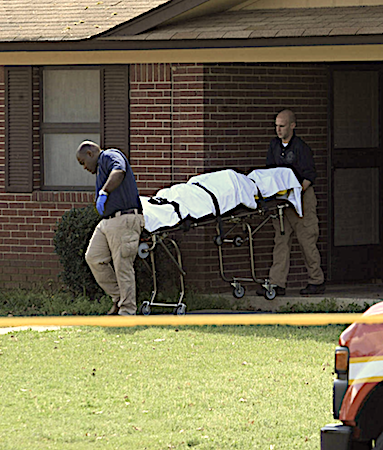
Did someone die in the house?
September 5, 2018As an instructor to other real estate agents, I stay up on the questions agents ask in classes and in online newsgroups. One common question is whether or not an agent can or should tell a potential buyer if someone has died in the home.
When this question is asked, I first think about my father, who had a heart attack and died in our home, and whether or not that makes the home less appealing or less valuable to a home buyer who is unlikely to have known my dad.
What about really old homes? How are real estate agents expected to know if someone died in a home decades or a century ago? At one of my recent classes, an agent informed me that there’s a website called DiedInHouse.com that, for a fee, will provide a report of any past deaths in a home. I have no idea where they get their information, or if it’s accurate, but I find it interesting that there’s a market for that data,
Throughout my years as a real estate agent, I’ve had buyer clients who’ve told me they prefer not to buy a home in which someone has died. I’ve had buyers ask me to ask the seller and listing agent to reveal what they know. When I’m asked any question about disclosure, my first questions are who do you represent in the transaction and where is the property located? I want to know which disclosure laws I’m to follow and whose interest I’m protecting.
So, are agents allowed to tell potential buyers if someone died in the home?
According to the National Association of REALTOR’s Code of Ethics,
Article 2, Standard of Practice 2-1: REALTORS® shall only be obligated to discover and disclose adverse factors reasonably apparent to someone with expertise in those areas required by their real estate licensing authority. Article 2 does not impose upon the REALTOR® the obligation of expertise in other professional or technical disciplines.
Then in Article 2, Standard of Practice 2-5, it says: Factors defined as “non-material” by law or regulation or which are expressly referenced in law or regulation as not being subject to disclosure are considered not “pertinent” for purposes of Article 2.
I’m licensed as an Associate Broker in DC, Virginia and Maryland. I’m not a lawyer. Here’s a quick look at how these three jurisdictions address this question about what is considered non-material.
MARYLAND

Maryland law clearly spells out the items they define as “non material” in Maryland Code – Real Property §2-120:
(a) Under this title, it is not a material fact or a latent defect relating to property offered for sale or lease that:
(1) An owner or occupant of the property is, was, or is suspected to be:
(i) Infected with human immunodeficiency virus; or
(ii) Diagnosed with acquired immunodeficiency syndrome; or
(2) A homicide, suicide, accidental death, natural death, or felony occurred on the property.
(b) An owner or seller of real property or the owner’s or seller’s agent shall be immune from civil liability or criminal penalty for failure to disclose a fact contained in subsection (a) of this section.
So, in Maryland, agents do not have to disclose if someone died in a home.
VIRGINIA
In Virginia, Section д55-524 (Virginia Residential Property Disclosure Act) of the Code of Virginia states the following:
Notwithstanding any other provision of this chapter or any other statute or regulation, no cause of action shall arise against an owner or a real estate licensee for failure to disclose that an occupant of the subject real property, whether or not such real property is subject to this chapter, was afflicted with human immunodeficiency virus (HIV) or that the real property was the site of:
1. An act or occurrence which had no effect on the physical structure of the real property, its physical environment, or the improvements located thereon; or
2. A homicide, felony, or suicide.
Though worded differently, a death in the home that is not a homicide, felony or suicide, such as an accidental death or a death by natural causes, could be seen as an occurrence which had no effect on the physical property and would not have to be disclosed.
DISTRICT OF COLUMBIA
DC Code § 47–2853.198 says:
Notwithstanding the possibility that a fact may have a psychological impact on a purchaser, lessee, or sublessee, it shall not be a material fact that must be disclosed in a real estate transaction, nor shall it be the basis for a cause of action against an owner of real property, a real estate broker, a real estate salesperson, a property manager, a lessee, or sublessee, that the following information was not disclosed to the purchaser, lessee, or sublessee:
(1) An occupant of real property, at any time, was infected or was or is suspected to have been infected with a human immune deficiency virus;
(2) An occupant of real property, at any time, has been diagnosed, was infected, or was suspected to have been diagnosed as having acquired immune deficiency syndrome or any other disease that has been determined by medical evidence to be highly unlikely to be transmitted through occupancy of property alone; or
(3) The property, at any time, has been or was suspected to have been the site of a suicide, homicide, or other felony.

All three jurisdictions declare that an occupant infected or suspected to be infected with HIV or AIDS is non-material. DC adds any disease that is not transferable by occupancy so a person dying of cancer or heart attack might be considered non-material with that language. So death in the home does not have to be disclosed.
What do you say if a buyer asks you directly if someone died in the home?
HONESTY
Article 1 of NAR’s Code of Ethics says:
When representing a buyer, seller, landlord, tenant, or other client as an agent, REALTORS® pledge themselves to protect and promote the interests of their client. This obligation to the client is primary, but it does not relieve REALTORS® of their obligation to treat all parties honestly. When serving a buyer, seller, landlord, tenant or other party in a non-agency capacity, REALTORS® remain obligated to treat all parties honestly.
Who do you Represent?
All three jurisdictions answer the question of disclosure by saying that an agent does not have to disclose a death in the home, and cannot be held accountable for not disclosing. However, an agent must treat all clients and customers honestly. So, unless it is specifically outlined as non-material, and it is something you actually know, would you disclose a death in the home to a potential buyer?
 As a listing agent, you don’t have to disclose. It is not in the best interest of your client to disclose.
As a listing agent, you don’t have to disclose. It is not in the best interest of your client to disclose.
DC mentions psychological impact on a buyer. What if a buyer specifically told you that a death in the home is a deciding factor that will influence their decision about whether or not to buy a home?
As a buyers agent, if you know someone died in the home, you don’t have to disclose, but you could.
Are you looking for a real estate agent committed to Honesty, Integrity, and Service that Cannot be Better? It’s Your Move. Give me a call to Get Started.

